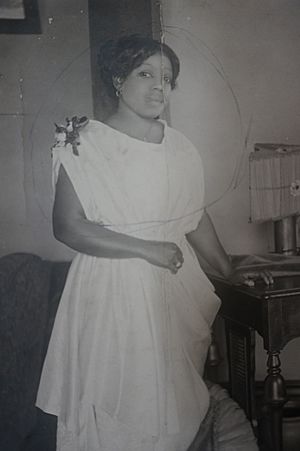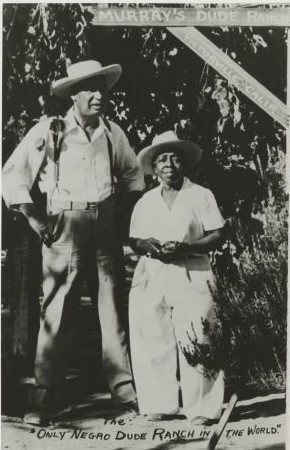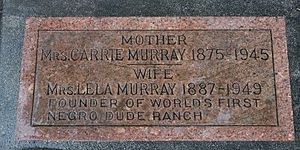Lela Murray facts for kids
Quick facts for kids
Lela Murray
|
|
|---|---|
 |
|
| Born |
Lela Campbell
June 12, 1887 |
| Died | March 18, 1949 (aged 61) |
| Spouse(s) | Nolie B. Murray |
Lela Murray (born June 12, 1887 – died March 18, 1949) was an important African American businesswoman and community leader. She worked for civil rights in Los Angeles in the early 1900s. Lela helped start Murray's Dude Ranch in Bell Mountain, California. This ranch was known as "the only Negro dude ranch in the world." It offered a fun place for people of color to relax during a time of racial segregation in the United States.
Lela's Early Life
Lela Campbell was born in 1887 in Hopkinsville, Kentucky. Her parents, Isaac Newton and Susie Campbell, were formerly enslaved people. They became teachers in schools that were separated by race. Her father, Isaac Newton, was even elected as Kentucky's first black magistrate. However, due to unfair accusations, his family moved to Kansas.
In 1894, Lela's family moved to San Diego, California. Here, her family faced many difficulties. Her father became ill, and her brother died from pneumonia in 1903. Later, a very sad event led to her mother's death and her father's imprisonment. After this, Lela and her sister, Vivian, went to live with relatives in Utah.
The sisters later returned to California and settled in Los Angeles. Lela did very well in Los Angeles. She became active in Philips Temple CME Church. She also volunteered for the black Y.W.C.A. and supported groups that helped African Americans in Los Angeles. In 1913, she married Nolie Murray, a rising businessman in the black community of Los Angeles.
Starting Murray's Ranch
By the 1920s, Nolie and Lela Murray were both successful business owners in Los Angeles. Nolie owned a bail-bond business, and Lela had a popular clothing store. Lela had some health issues, so they decided to find a home in the desert. They looked at Bell Mountain, a community where black families could settle. They had tried to claim land there before, in 1915, but their city businesses kept them too busy.
In 1928, they bought 40 acres of land in Bell Mountain. Here, they created Murray's Dude Ranch. For years, they entertained friends there. Then, in 1937, Lela and Nolie opened the ranch to the public. It was advertised as the first and "only dude ranch owned and operated by Negroes in America." The press called it "the only negro dude ranch in the world." The ranch was often featured in the Los Angeles newspaper, California Eagle. The editor, Charlotta Bass, was a close friend of Lela's and often stayed at the ranch.
Life at the Ranch
Murray's Ranch opened when many white-only dude ranches were becoming popular around Los Angeles. Murray's Ranch gave middle and upper-class African Americans the same chance for recreation. This was important during a time of increasing segregation and Jim Crow laws. Guests at the ranch could enjoy riding horses, hunting, golfing, and swimming in a modern pool. They could also just dress up and "play cowboy." Lela herself was known for wearing western clothes, including a ten-gallon hat, instead of her city outfits.
Famous people from Los Angeles's black community visited the ranch. These included celebrities like Lena Horne, Joe Louis, and Herb Jeffries. Herb Jeffries even filmed movies at Murray's Ranch. Lela also hosted Easter Sunrise services. Members of Los Angeles's most important black churches attended these services. Lela was also active in the Bell Mountain Improvement Association. She helped improve the community's roads and build a new community center.
During World War II, the USO club in Victorville only allowed white soldiers. Lela offered Murray's Ranch as an alternative USO club for soldiers of all races. It was the only place in Victorville where black servicemen's families could find a place to stay.
Lela Murray's Legacy
After two years of poor health, Lela Murray passed away on March 18, 1949, in San Bernardino. Two memorial services were held to honor her life, one in Victorville and one in Los Angeles. In her eulogy, Reverend Orene Phelps compared Mrs. Murray to "a desert flower." This meant she was something beautiful and unexpected that grew well in a difficult place. Lela Murray is buried at Evergreen Cemetery in Los Angeles, California.
 | Roy Wilkins |
 | John Lewis |
 | Linda Carol Brown |



